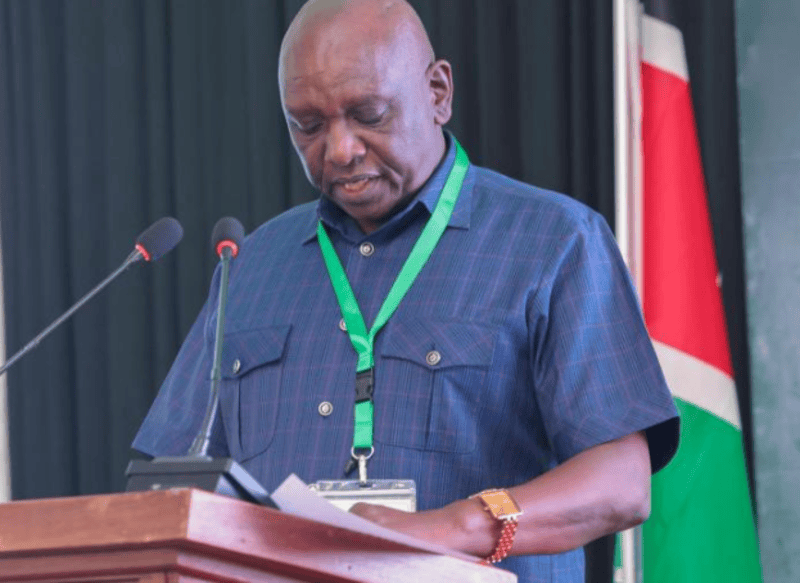1,200 arrested, Sh12 billion seized in major Interpol cybercrime crackdown across Africa

The operation brought together investigators from 18 African countries and the United Kingdom to target high-harm and high-impact cybercrimes, identified as prominent threats in the recent Interpol Africa Cyberthreat Assessment Report.
Over 1,200 suspected cybercriminals have been arrested in a three-month Interpol-led crackdown across Africa, which also recovered $97.4 million (Sh12.58 billion) and dismantled more than 11,000 online crime infrastructures.
The crackdown, dubbed Operation Serengeti 2.0 and conducted between June and August 2025, exposed widespread online fraud, cryptocurrency scams and business email compromises affecting nearly 88,000 victims.
More To Read
- Blogger charged with publishing false information on Mwingi Central MP Mulyungi
- Kenyan banks tighten oversight of third-party tech firms amid rising cyber threats
- Nakuru to host 'World Day Against Trafficking in Persons' commemoration amid rise in cases
- Kenya records historic cyber attack surge with 4.6 billion threats in four months this year
- Murder suspect apprehended by FBI in Kenya, extradited to Washington
- Kenya's cyber threats soar 202 per cent in Q1, hitting 2.5 billion
The operation brought together investigators from 18 African countries and the United Kingdom to target high-harm and high-impact cybercrimes, identified as prominent threats in the recent Interpol Africa Cyberthreat Assessment Report.
The report noted that in Angola, authorities dismantled 25 illegal cryptocurrency mining centres, where 60 Chinese nationals were illegally validating blockchain transactions to generate digital currency.
The operation also uncovered 45 illicit power stations, which were confiscated along with IT and mining equipment valued at more than $37 million (Sh4.78 billion).
“The Angolan government plans to repurpose the seized equipment to support power distribution in vulnerable areas,” Interpol said.
In Zambia, a large-scale online investment fraud scheme was dismantled, revealing some 65,000 victims who lost an estimated $300 million (Sh38.76 billion).
The report indicated that scammers lured victims into investing in cryptocurrency via aggressive advertising campaigns promising high returns and instructed them to download multiple apps to participate. Authorities arrested 15 individuals and seized evidence, including domains, bank accounts, mobile numbers and other digital data. Investigations are ongoing, focusing on tracking overseas collaborators.
Zambian authorities also disrupted a suspected human trafficking network in coordination with the Lusaka Immigration Department, confiscating 372 forged passports from seven countries.
Despite being one of the oldest-running internet frauds, the report noted that inheritance scams continue to generate significant criminal proceeds. Officers in Côte d’Ivoire dismantled a transnational inheritance scam originating in Germany, arresting the main suspect and seizing assets including cash, electronics, jewellery, vehicles and documents.
It noted that victims were tricked into paying fees to claim fake inheritances, resulting in estimated losses of $1.6 million (Sh206.72 million).
“Each Interpol-coordinated operation builds on the last, deepening cooperation, increasing information sharing and developing investigative skills across member countries. With more contributions and shared expertise, the results keep growing in scale and impact. This global network is stronger than ever, delivering real outcomes and safeguarding victims,” Interpol Secretary General Valdecy Urquiza said.
The operation was conducted under the African Joint Operation against Cybercrime, funded by the United Kingdom’s Foreign, Commonwealth and Development Office, and supported by private-sector partners including Cybercrime Atlas, Fortinet, Group-IB, Kaspersky, The Shadowserver Foundation, Team Cymru, Trend Micro, TRM Labs and Uppsala Security.
Participating countries included Angola, Kenya, Benin, Cameroon, Chad, Côte d’Ivoire, Democratic Republic of Congo, Gabon, Ghana, Mauritius, Nigeria, Rwanda, Senegal, South Africa, Seychelles, Tanzania, United Kingdom, Zambia and Zimbabwe.
The report noted that private sector partners played a critical role in the crackdown, providing intelligence, guidance and training to investigators. Ahead of the operation, countries received actionable information, including suspicious IP addresses, domains and C2 servers, enabling authorities to identify and act against offenders effectively.
Before the operation, investigators participated in hands-on workshops covering open-source intelligence tools, cryptocurrency investigations, and ransomware analysis. The training strengthened investigators’ skills, contributing directly to the effectiveness of the crackdown.
Operation Serengeti 2.0 also emphasised preventive measures through the International Cyber Offender Prevention Network (InterCOP), a consortium of 36 law enforcement agencies led by the Netherlands. The project seeks to identify and mitigate cybercriminal activity before it occurs, promoting a proactive approach to tackling cybercrime.
Reports indicate that cybercrime now accounts for over 30 per cent of all reported crimes in West and East Africa, with online fraud cases rising as much as 3,000 per cent in some countries over the past year, Interpol noted.
Top Stories Today













































